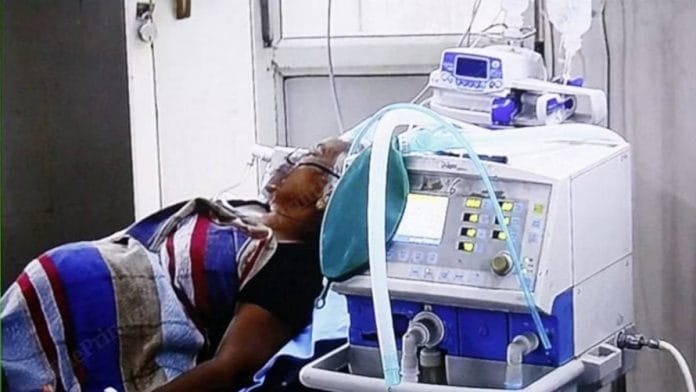New Delhi: Nearly 3.42 lakh fraud cases, that include unnecessary surgeries, have been detected under the Centre’s flagship health insurance scheme Ayushman Bharat Pradhan Mantri Jan Arogya Yojana (AB-PMJAY), the government informed Parliament Friday.
In response to a question by Congress MP Murari Lal Meena, the Union Health Ministry told Lok Sabha that, as of 11 December, a total of 342,988 fraud cases have been identified under the scheme launched in 2018.
Out of these, 286,771 cases were in the categories of medical management and 56,217 in surgical management, the written reply said.
Meena, the Lok Sabha representative from Dausa in Rajasthan, wanted to know whether the government was aware of the deaths taking place under the scheme due to procedures such as an unnecessary angioplasty and other surgeries in reputed hospitals.
Last month, Ahmedabad-based Khyati Multispecialty Hospital made headlines after two “patients” registered under the scheme died following angioplasty procedures that were later found to be “unnecessary”.
A press release issued by the Gujarat health department this week said it has debarred five private hospitals from providing services following an audit of the scheme. This takes the count of medical facilities de-panelled in 2024 to 12.
Under AB-PMJAY, beneficiaries are entitled to cashless hospitalisation of up to Rs 5 lakh for secondary- and tertiary-level healthcare in empanelled hospitals.
Around 12.3 crore families of poor socio-economic status have been covered under the programme so far. The scheme has now been extended to all aged 70 and above, irrespective of their income status.
In response to another query, the government told the Lower House that as on 30 November, a total of 8.39 crore hospital admissions worth Rs 1.16 lakh crore had been authorised under the scheme. This indicates, as per the replies, that less than 0.5 percent of admissions were identified as fraudulent.
Anti-fraud measures in place
The government said the scheme was governed by a zero-tolerance approach to any kind of abuse and that various steps were taken to prevent, detect and deter different kinds of fraud that could occur at different stages of the scheme’s implementation.
The National Anti-Fraud Unit (NAFU), for instance, has been established under the National Health Authority (NHA)—the central agency that runs the programme—and works in close coordination with state anti-fraud units (SAFU) to investigate and take action against issues related to fraud and abuse.
“Appropriate actions including suspension, show cause notice, warning letter, de-empanelment of hospitals, deactivation of e-cards, levying penalty on errant hospitals and lodging of FIRs are taken against fraudulent entities,” the reply said.
It added that transaction data on NHA IT systems was monitored on a real-time basis through a dedicated dashboard known as risk-assessment detection and analytical reporting.
Further, a tracking system has been developed under the scheme for a 360-degree view of fraud control—from reporting to monitoring action taken on suspicious transactions. Multiple avenues have been created for reporting fraud and abuse by empanelled hospitals.
As of now, a total of 29,929 hospitals are empanelled under the scheme, including 13,222 private ones.
(Edited by Tikli Basu)
Also Read: Putting state-run hospitals in private hands is an ongoing experiment. It doesn’t always pan out







Medical industry uses this scheme to catch money sometime it’s really emergency depend on case rather than they just compulsory to use scheme when not necessary
Artificial Intelligence and Machine Learning can be very effective in detecting such frauds. However, that would require a very highly trained batch of software engineers and sizeable investment in technology.